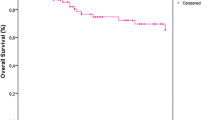Abstract
Breast cancer is the most common cancer in women globally(1). It is usually a disease of old age. The incidence of breast cancer in females younger than 40 years is as low as 0.5%. Disease in patients with age less than or equal to 40 years at diagnosis is usually considered a young breast cancer(2). Occurrence of more adverse pathological features like triple negative and Her2 positive breast cancer as well as lacking reliable screening methods in young women leads to the poor prognosis in this group of patients(3). In the present study we aim to find the clinical and pathological characteristics of breast cancer in young women and their survival outcome for 5 years comparing the same with those characteristics of the older patients. Patients with nonmetastatic carcinoma breast who had registered at Regional Cancer Centre, Trivandrum, during the year 2012 were selected for the study. Patient’s details including the clinicopathological features, treatment details, oncologic outcomes including recurrence, and survival data until 31 July 2019 were collected from treatment files kept in the hospital and via telephonic interview. Kaplan–Meier method was employed for survival analysis. Survival comparison was done using the log-rank test. Cox proportional hazards regression analysis was done for assessing the risk. Out of 1611 curatively treated patients with carcinoma breast, 281 (17.44%) were young breast cancer (equal to or less than 40 years). The median follow-up period was 82 months. Median age of diagnosis was 51.3 years. Young patients presented with larger tumour size, but nodal stage and composite stage, were not different. They had more TNBC status, 35% vs. 24%, p = 0.001. Young patient group had a drop in 5-year OS but statistically insignificant (75.9% vs. 82.5%, p = 0.179) and marginally significant drop in DFS (68.1% vs. 73.8%, p = 0.064). The proportion of young breast cancer is very high in the Indian population. Age is not an independent risk factor for worse prognosis. T and N stage, Her2nue status, and adequacy of nodal clearance are the most important independent risk factors deciding the 5-year OS.


Similar content being viewed by others
References
Siegel R, Naishadham D, Jemal A (2013) Cancer statistics, 2013. CA Cancer J Clin 63(1):11–30
Anders CK, Hsu DS, Broadwater G, Acharya CR, Foekens JA, Zhang Y et al (2008) Young age at diagnosis correlates with worse prognosis and defines a subset of breast cancers with shared patterns of gene expression. J Clin Oncol Off J Am Soc Clin Oncol 26(20):3324–3330
Sidoni A, Cavaliere A, Bellezza G, Scheibel M, Bucciarelli E (2003) Breast cancer in young women: clinicopathological features and biological specificity. Breast Edinb Scotl 12(4):247–250
Carvalho FM, Bacchi LM, Santos PPC, Bacchi CE (2010) Triple-negative breast carcinomas are a heterogeneous entity that differs between young and old patients. Clin Sao Paulo Braz 65(10):1033–1036
Kroman N, Jensen MB, Wohlfahrt J, Mouridsen HT, Andersen PK, Melbye M (2000) Factors influencing the effect of age on prognosis in breast cancer: population based study. BMJ 320(7233):474–478
Porter PL (2009) Global trends in breast cancer incidence and mortality. Salud Publica Mex 51(Suppl 2):s141-146
Winchester DP, Osteen RT, Menck HR (1996) The National Cancer Data Base report on breast carcinoma characteristics and outcome in relation to age. Cancer 78(8):1838–1843
Deshmukh SP, Mane AD, Zade BP, Sane SP (2014) Retrospective analysis of clinicopathological factors and outcome in breast cancer in young women in a tertiary care hospital in India. Indian J Cancer 51(4):594
Althuis MD, Brogan DD, Coates RJ, Daling JR, Gammon MD, Malone KE et al (2003) Breast cancers among very young premenopausal women (United States). Cancer Causes Control CCC 14(2):151–160
Colleoni M, Rotmensz N, Robertson C, Orlando L, Viale G, Renne G et al (2002) Very young women (<35 years) with operable breast cancer: features of disease at presentation. Ann Oncol Off J Eur Soc Med Oncol 13(2):273–279
Nixon AJ, Neuberg D, Hayes DF, Gelman R, Connolly JL, Schnitt S et al (1994) Relationship of patient age to pathologic features of the tumor and prognosis for patients with stage I or II breast cancer. J Clin Oncol Off J Am Soc Clin Oncol 12(5):888–894
Turchetti D, Cortesi L, Federico M, Bertoni C, Mangone L, Ferrari S et al (2000) BRCA1 mutations and clinicopathological features in a sample of Italian women with early-onset breast cancer. Eur J Cancer Oxf Engl 1990 36(16):2083–9
Chopra. Clinical Cancer Investigation Journal. [cited 2019 Dec 8] Available from: http://www.ccij-online.org/article.asp?issn=2278-0513;year=2014;volume=3;issue=6;spage=526;epage=529;aulast=Chopra
Pakseresht S, Ingle GK, Bahadur AK, Ramteke VK, Singh MM, Garg S et al (2009) Risk factors with breast cancer among women in Delhi. Indian J Cancer 46(2):132–138
Dey S, Boffetta P, Mathews A, Brennan P, Soliman A, Mathew A (2009) Risk factors according to estrogen receptor status of breast cancer patients in Trivandrum. South India Int J Cancer 125(7):1663–1670
Dominici LS, Kuerer HM, Babiera G, Hahn KME, Perkins G, Middleton L et al (2010) Wound complications from surgery in pregnancy-associated breast cancer (PABC). Breast Dis 31(1):1–5
Nair MK, Sankaranarayanan R, Nair KS, Amma NS, Varghese C, Padmakumari G et al. Overall survival from breast cancer in Kerala, India, in relation to menstrual, reproductive, and clinical factors. Cancer
Nair N, Shet T, Parmar V, Havaldar R et al Breast cancer in a tertiary cancer center in India, an outcome analysis. Indian J Cancer 2018
Zhang X, Yang J, Cai H, Ye Y (2018) Cancer Manag Res 10: 4005–4018. https://doi.org/10.2147/CMAR.S167363
Author information
Authors and Affiliations
Corresponding author
Ethics declarations
Conflict of Interest
The authors declare no competing interests.
Additional information
Publisher's Note
Springer Nature remains neutral with regard to jurisdictional claims in published maps and institutional affiliations.
Rights and permissions
About this article
Cite this article
Abdulla, K.P., Augustine, P., Radhakrishnan, N. et al. Is Young Age an Independent Prognostic Factor in Carcinoma Breast? A Single-Institution Retrospective Comparative Study from South India. Indian J Surg Oncol 13, 783–788 (2022). https://doi.org/10.1007/s13193-022-01542-6
Received:
Accepted:
Published:
Issue Date:
DOI: https://doi.org/10.1007/s13193-022-01542-6




